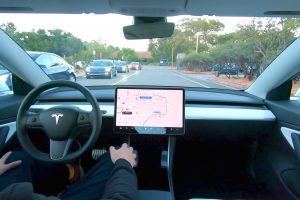- 🚗 Chinese automakers are accelerating the development of advanced driver assistance systems (ADAS) to compete in the electric vehicle market.
- 🌟 Pre-autonomous driving systems have become a key competitive area for electric vehicle manufacturers in China.
- 📈 Consultancy Counterpoint Research estimates 1 million electric vehicles in China will meet Level 3 autonomous standards by 2026.
- 🏁 Leading Chinese automakers, including BYD, have already launched cars with L3 ADAS capabilities.
- 🇨🇳 Some Tesla users believe the company remains at Level 2 but is progressing with its ADAS advancements.
- 🚦 Elon Musk indicated that Tesla’s FSD might receive approval in China by the end of 2024.
- 🔍 FSD (Supervised) buttons in Tesla vehicles suggest progress in meeting Chinese regulatory standards.
- ⏳ The Chinese government’s restriction on L3 capabilities allows more time for ADAS development towards full autonomy.
The automotive industry stands at the forefront of innovation, driving us toward a future where vehicles can navigate roads without human intervention. While Tesla has been a dominant player in the arena of Full Self-Driving (FSD), Chinese automakers are making significant strides in developing advanced driver assistance systems (ADAS). This blog post explores how these emerging technological advancements are transforming the landscape of autonomous vehicles in China, the key players involved, and what the future holds for this booming industry.
The Push for Advanced Driver Assistance Systems (ADAS)
A Shift in Focus
As the demand for electric vehicles (EVs) rises exponentially, Chinese automakers are keen on gaining a competitive edge. A pivotal area of development has been advanced driver assistance systems (ADAS). These systems are critical in the pathway towards fully autonomous vehicles, providing features like adaptive cruise control, lane-keeping assistance, and automated parking.
Market Projections
According to a report by Consultancy Counterpoint Research, China is poised to have nearly 1 million electric vehicles meeting Level 3 (L3) autonomous driving standards by 2026. This projection underscores the critical importance of ADAS technology in the near future and emphasizes China’s commitment to being a leader in autonomous vehicle technology.
Key Players in the Autonomous Vehicle Market
Chinese Automakers Lead the Charge
Leading Chinese automakers such as BYD are aggressively pursuing L3 ADAS capabilities, launching products equipped with these advanced systems. Their rapid advancements and achievements in this space demonstrate their dedication to setting industry standards.
Tesla’s Progress and Challenges
While Tesla has made significant strides globally, some users believe that its Full Self-Driving (FSD) capabilities remain at Level 2 in China. However, the company is actively working on advancing its ADAS technologies. Notably, Elon Musk has mentioned that Tesla’s FSD might receive approval in China by the end of 2024. The sighting of FSD (Supervised) buttons in Tesla vehicles within China suggests progress in adapting to local regulatory requirements, indicating Tesla’s ongoing commitment to this market.
Regulatory Environment: Navigating the Road to Autonomy
China’s regulatory framework is a critical factor in the development and deployment of autonomous vehicles. Currently, the government does not permit the use of L3 autonomous capabilities on local roads, allowing automakers additional time to refine their systems towards achieving full autonomy. This regulatory landscape provides a unique challenge, pushing automakers to innovate while adhering to strict guidelines.
The Future of Autonomous Vehicles in China
Opportunities and Challenges
The race towards full autonomy is not without its hurdles. The challenge lies in not just developing advanced systems but also ensuring that these technologies are safe, reliable, and widely accepted by consumers. However, the opportunities are immense, promising safer roads, reduced traffic congestion, and a shift in the traditional automotive paradigm.
Potential Impact on Global Markets
The developments within China’s autonomous vehicle sector will have far-reaching implications. As Chinese automakers continue to enhance their ADAS capabilities, the global market will feel its influence. With advancements in technology and regulatory nods, China’s journey towards autonomous vehicles could redefine the global landscape.
Conclusion
Chinese automakers and Tesla are both playing pivotal roles in shaping the future of autonomous driving in China. As they progress through different levels of autonomy, they not only challenge each other but inspire innovation on a global scale. As we look to the future, the potential for autonomous technology seems limitless, promising significant advancements in safety, efficiency, and user experience in the years to come.





